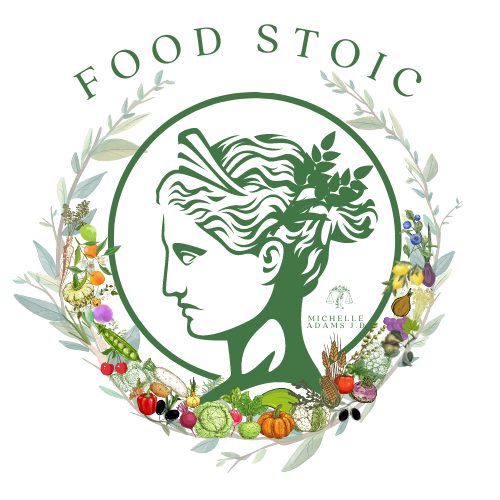I am a lawyer who was a medical litigator for 20 years and a food business owner for 12 years. In this series I spill what food I won’t eat and why. Today I’m sharing why I would not eat food sprayed with glyphosate.
About Glyphosate
The most widely used herbicide in the world is glyphosate. While that is the chemical name, it is commonly known as Roundup weed killer. Farmers use glyphosate heavily to control weeds, particularly farming grains such as Oats, Corn, Soy and Wheat. The EPA first authorized glyphosate in the the mid-1970’s. It has been reauthorized since then, with another reauthorization currently pending. In 1991 the EPA mysteriously changed its cancer classification from having suggestive evidence of carcinogenic potential to having no evidence of carcinogenic potential. The latter classification persists today.
Glyphosate is controversial. You will find a plethora of written and oral material both for and against glyphosate. Is it safe or isn’t it? Does it cause cancer or not? Does it interfere with the gut microbiome or is that hog wash? It’s safe to say that it’s a topic that confuses even those with heightened knowledge of it.
Despite the mixed messages about Glyphosate, there are studies which show that exposure to Glyphosate may cause cancer. This has led the WHO’s International Agency for Research on Cancer to declare it a probable carcinogen. Despite this classification, and the evidence stacking up to support it, the EPA continues to declare that Glyphosate is safe for consumers.
Monsanto was the company that created Glyphosate and then sold it to Bayer right before the onslaught of litigation. Thus, you’ll see reference to the company as “Monsanto-Bayer”. Consumers have filed thousands of lawsuits against Monsanto-Bayer alleging damages as a result of injuries caused by Glyphosate. The most common type of cancer associated with Glyphosate is non-Hodgkin’s Lymphoma.
The Litigation
There have been no less than three separate jury trials that have found Monsanto Bayer guilty of failing to warn of glyphosate related cancer risks, and those juries have awarded hundreds of millions of dollars in damages to the plaintiffs who alleged their cancer was caused by Roundup. In fact, in May 2019 the jury in Pelliod v, Monsanto awarded the plaintiffs $2 billion dollars, which was later reduced to $87 million dollars. Much of the initial award was for punitive damages, meaning the jury found Monsanto’s actions to be egregious.
Since then Monsanto Bayer has settled over 100,000 lawsuits paying out $11 billion dollars in settlement funds to injured plaintiffs.
It’s a staggering number, not just because of how many people claim to be injured, but more because the proponents of glyphosate (particularly Bayer and the EPA) continue to claim it is safe.
In fact, the U.S. Court of Appeals for the 9th Circuit Court has urged the EPA to reconsider its interim registration review decision that Glyphosate is safe. Additionally, the 11th Circuit Court has ruled that Bayer failed to warn about the risk of cancer and the Supreme Court has dismissed Bayer’s appeal in another Roundup case. There are still over 30,000 Roundup lawsuits pending.
My Opinion on Glyphosate
So here’s why I won’t eat food sprayed with Glyphosate:
- The common denominator in all of the Roundup litigation is a plaintiff who used Roundup and now has cancer;
- In order for the lawsuits against Monsanto to get to jury, they needed to pass a minimum threshold or they would be tossed out by a judge;
- Lawsuits passing the minimum threshold make it to juries that consider evidence very thoroughly for months—in this case, evidence such as documents, correspondence, conversations, medical records and the testimony of witnesses. Witnesses ranged from Monsanto employees to medical experts, scientists and even EPA workers.
- Additionally, when the jury’s verdict is plainly wrong, it can be tossed out. These verdicts weren’t overturned.
- The 9th Circuit’s request to the EPA is very telling about what the legal world knows about glyphosate.
- Moreover, the EPA’s interim opinion on recertifying glyphosate, as well as the briefs and opinion filed because of it, including the 9th Circuit’s request for it to reconsider the opinion and the EPA’s withdrawal of it’s interim opinion thereafter, are equally as telling. The 9th Circuit asked the EPA to reexamine it’s 2020 finding that glyphosate does not pose a health risk to people exposed to it by any means, including farms, yards, roadsides and even residue left on food crops.
- Bayer has settled over 100,000 lawsuits.
- There are many studies by independent researchers that support glyphosate is not safe.
- There is evidence that suggests that the EPA is a captured agency and that Monsanto Bayer is manipulating scientific studies while the EPA is relying on those studies alone. The documents supporting this are known throughout the world as the Monsanto Papers.
When I was trying cases I always ended my closing argument with the Latin definition of the word Verdict. It means “To speak the truth”. Politics is a far cry from that, but judgment is law.
For more about Glyphosate, read here: The Case for Organic Produce.











